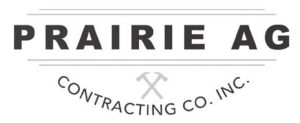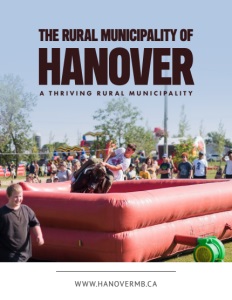A Thriving Rural Municipality
Balancing agriculture, Infrastructure, and small business development for a brighter future
As one of the fastest-growing rural areas in southeastern Manitoba, the Rural Municipality (RM) of Hanover has established itself as a leader in economic and agricultural development.
The RM of Hanover drives growth using a proactive, hands-on approach.
The municipality’s strong foundation in agribusiness, thriving small business sector, and rapidly expanding population show that Hanover isn’t just keeping pace with change—it is shaping the future.
The municipality’s leadership is committed to balancing expansion with sustainability, ensuring that every initiative enhances economic opportunities and residents’ quality of life.
For example, Hanover is spearheading the Red-Seine-Rat (RSR) Regional Wastewater Treatment Facility. This transformative infrastructure project will remove critical development barriers and position the municipality for long-term prosperity.
This initiative is a collaboration among multiple municipalities and is intended to allow for continued residential and industrial expansion.
Hanover is also actively advocating for the expansion of key provincial highways, recognizing that improved transportation networks are vital for supporting its growing population and business community.
Hanover excels in fostering strong local economies within its five distinct communities.
By supporting industrial parks, small businesses, and recreational investments, the municipality provides residents with modern amenities while preserving its rustic appeal.
Additionally, Hanover’s growing population is young, so strategic planning in education, housing, and public spaces remains a priority. Leadership remains focused on ensuring that growth is not only rapid but also sustainable.
The municipality is laying the groundwork for unprecedented economic success with cutting-edge infrastructure projects that will support its local economy in the future.
As new industries emerge, infrastructure transforms, and housing developments take shape, Hanover continues to stand as one of southeastern Manitoba’s primary socioeconomic drivers.
Hanover is charting a future that blends economic vitality with an exceptional quality of life—one that is rapidly becoming a model for rural success.

A Municipality of Amenities and Agricultural Prowess
With a population of over 20,000, the Rural Municipality of Hanover stands a unifying presence in its region. The municipality comprises five local urban districts (LUDs): Blumenort, Grunthal, Kleefeld, Mitchell, and New Bothwell.
Each community has 1000 to 3000 residents and is individually distinguished by the unique community fairs and events it hosts.
Collectively, Hanover’s communities are known for providing peaceful, high-quality lifestyles. The municipality neighbors the rapidly growing city of Steinbach and the town of Niverville, positioning it at the heart of Manitoba’s rural economic engine.
One of Hanover’s main attractions is its motocross scene, which draws people from all over the world, from proximal regions like Quebec to far-off regions like Mexico and even Australia!
Additionally, the Hanover Agricultural Society hosts multiple events throughout the year that attract considerable outside tourism and attention.
In addition to its community events, Hanover is also known for its beautiful trails, bike paths, and nature-oriented attractions.
“About three years ago, we constructed a major pathway to Rosenthal Park, about a mile and a half away from us. We made a nice asphalt pathway that sees a lot of traffic. People like to come there and either cycle or walk the path, especially in the summertime,” says Councillor for Ward Two and Deputy Reeves Brian Esau.
Hanover has successfully maintained its natural roots while embracing industrial and commercial opportunities, making it a pivotal player in Manitoba’s long-term development.
Agriculture is the backbone of Hanover’s economy. “Grain farming, livestock, poultry, hogs, and dairy. It’s value-added agriculture as well, so we’re also converting livestock into finished products. We do that locally,” explains Chief Administrative Officer Luc Lahaie.

Thanks to this robust sector, Hanover plays a vital role in provincial food production.
The presence of major processing plants, including dairy facilities in New Bothwell and Grunthal and a poultry processing plant in Blumenort, strengthens and secures the municipality’s agricultural supply chain.
Beyond farming, the RM of Hanover is home to numerous agri-support businesses.
“One thing that I find unique about us is that we have lots of contractors and self-employed people who run businesses out of their residences,” says Councillor Curtis Dawydiuk, who oversees economic development as one of his portfolios for the municipality.
From fertilizer suppliers to welding and fabrication shops, Hanover’s continued success ensures food security and sustains thousands of jobs within the municipality.
Expanding Infrastructure to Support Economic Growth
Recognizing the need for modern infrastructure to sustain growth, Hanover is making strategic investments in roads, wastewater management, and digital connectivity.
In terms of its roads, Hanover has three major provincial highways—PTH 12, PTH 52, and PTH 59—but leaders have been advocating for years to expand these highways to four lanes to accommodate increasing traffic and prevent accidents.
One of Hanover’s most ambitious projects is the Red-Seine-Rat (RSR) Wastewater Treatment Facility, a cooperative initiative with six surrounding municipalities.
“We would like to start tendering out some of the work by May… of course, we will need funding. We’ve gotten some, but we know we will need more,” says Reeve Jim Funk.
Initially projected at $130 million, the project’s cost has risen to $225 million due to supply chain constraints and inflation. The project is expected to be a game-changer, allowing for further industrial and residential expansion by lifting wastewater capacity limitations.
Meanwhile, digital connectivity has seen remarkable improvement, with providers like Xplore and Valley Fiber expanding high-speed internet access to most of the municipality.
However, despite Hanover’s advancement, Manitoba as a whole is grappling with a housing crisis.
Hanover is proactively working to increase housing stock while maintaining affordability. Residential projects are underway in all five local urban districts, with a focus on multi-phase developments that cater to various income levels.
“In Mitchell, there’s a contractor that has purchased a sizable tract of land and will be constructing affordable housing near our main park, so it gives lots of accessibility for kids to play, and that will be starting this summer,” Esau confirms.
In Mitchell, the affordable housing project will add 200 new units adjacent to a central park, offering residents easy access to recreation.
Additionally, in Grunthal, the first two phases of a 70-lot housing development have already sold out, reflecting the high demand for new homes. Similar expansions are taking place in New Bothwell, Kleefeld, and Blumenort, with developers working closely with municipal planners to ensure responsible growth.
While agriculture remains a dominant industry, Hanover is also working to expand its commercial and industrial base.
The Mitchell Industrial Park, established in 2012, has reached full capacity, prompting the municipality to acquire additional land for expansion.
The park houses small- to medium-sized industrial businesses, and Hanover aims to attract more manufacturers and employers to diversify its economic base.
Discussions are also underway with international investors, including a German firm considering relocating part of its operations to Hanover.
If realized, this investment would mark a significant step in positioning the municipality as a competitive destination for industrial growth.
A Proactive Approach to Sustainable Governance
Hanover has long been a hub for immigration, particularly from Germany and Russia.
New residents from these areas bring skilled labor and strong family values, further fueling the local economy. With an average household size of 3.5 residents and a young demographic, the demand for schools, recreation, and housing remains high.
Hanover’s leadership is hands-on, working closely with developers and residents to ensure that growth aligns with the community’s vision.
Community engagement remains a cornerstone of governance, with elected leaders emphasizing the importance of listening to constituents.
Esau notes that today’s residents expect a higher level of services and amenities, from waste collection to urban-style recreation. So, beyond economic development, Hanover is also committed to enriching residents’ quality of life.
The municipality is responding by modernizing its approach while preserving its rural character. Recreational opportunities have expanded significantly, with a focus on both traditional and emerging sports.
“A significant number of people are coming from Winnipeg… so we’re catering to what they’ve experienced in terms of big city recreation,” Lahaie states. While hockey has long been a Hanover staple, soccer’s popularity is surging due to immigration-driven demographic shifts.

Plans are in motion for a FIFA-sized indoor soccer facility that could also host trade shows and agricultural expos.
Active transportation is also a priority. While the municipality’s rural layout makes large-scale pedestrian networks challenging, individual LUDs have developed local pathways.
The most notable success is the aforementioned paved trail connecting Mitchell to the Rosenthal Nature Park.
Additionally, the Tourond Creek Discovery Centre has transformed a former landfill into a thriving wildlife attraction, demonstrating Hanover’s commitment to environmental sustainability.
The municipality has also embraced a customer-service-oriented approach to planning and permitting, making it easier for businesses and residents to navigate regulations.
As Hanover moves forward, its leadership is focused on strategic, responsible growth. The success of the RSR Wastewater Treatment Facility will be pivotal in unlocking new industrial and residential opportunities.
Economic diversification is also high on the agenda, with efforts to attract commercial and industrial enterprises that complement the existing agricultural sector.
By fostering a balanced economy, Hanover aims to create a sustainable future where businesses thrive, families grow, and communities remain vibrant.
With a clear vision, proactive governance, and a commitment to preserving its rural roots, Hanover is poised to remain one of Manitoba’s most dynamic and economically resilient municipalities.
As the region continues to evolve, the municipality’s ability to adapt and innovate will be key to shaping its next decade of success.
AT A GLANCE
Who: The Rural Municipality (RM) of Hanover
What: One of southeastern Manitoba’s fastest-growing rural areas, distinguished by its strong agricultural industry, expanding infrastructure, and vibrant communities.
Where: Southeastern Manitoba
Website: www.hanovermb.ca
PREFERRED VENDORS/PARTNERS

At Prairie AG Contracting, we prioritize client satisfaction, delivering top-quality results in residential, commercial, and agricultural projects. With expertise, innovation, and customized solutions, we exceed expectations while staying on budget and schedule. More than contractors, we’re partners—building trust, lasting relationships, and results that stand the test of time.
Prairie AG Contracting Co Inc.: gil.prairieagcontractingco@gmail.com

Bituminex Paving Ltd. is a Winnipeg-based company owned and operated by Manitobans since 1987. We employ approximately 300 men and women in peak season and are one of Winnipeg’s largest road construction companies. Our proven track record of completing projects of any size on-time and on-budget speaks for itself.
Bituminex Paving: www.bituminex.com


